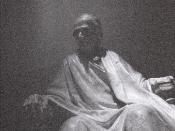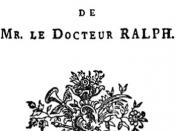Seung (Peter) Baek His 1C: Dis 1F
Apr 15 2014
History 1C:
First Paper
The Unidentified Garden
How do you interpret the last line of Candide, "Let us cultivate our garden?
Seung (Peter) In Baek: 804117200
Fueled by the Enlightenment, the Eighteenth Century opened a new chapter for the "West to rule" (Russel, April 7th). All across Europe, revolutionary and radical philosophers advanced humanity into reason and away from old tradition. The enlightenment thinker's rushed to acquire knowledge and a sense of enthusiasm or hope for humanity predominated the continent. However, in Candide, Voltaire ends his satire with the scene of the mutualized and aged heroes of the tale. The gloomy and grotesque ending plays with the reader's expectation of a cheerful ending stemming from Chaucer or the genre of Courtly love. At the last scene the harshly mutilated heroes, caused by torture and hardships, make a visit to an old man's garden -- offering a glimpse of hope for the reader.
The garden owned by the Turk is plentiful in fruit and is obstructed from "weariness, vice and want" (Voltaire, 86). Depicted as a paradise, the garden is small but efficient, nesting a diverse array of tropical fruits. Echoed through the symbol of eating and the importance placed upon food, the garden is juxtaposed to the zealous religion, unproductive nobility and extravagant philosophical norms that oppress reason and common sense throughout the tale. The parody's last line "Let us cultivate our garden," encourages the use of common sense and the rationale; rooted in reality of daily lives and absent from old tradition.[1: A celebrated poet from the middle ages.]
Through the use of a mocking tone in the narrative voice in the exposition and descriptive setting of the castle, Voltaire exposes the arrogance of the aristocracy and flaw in...


